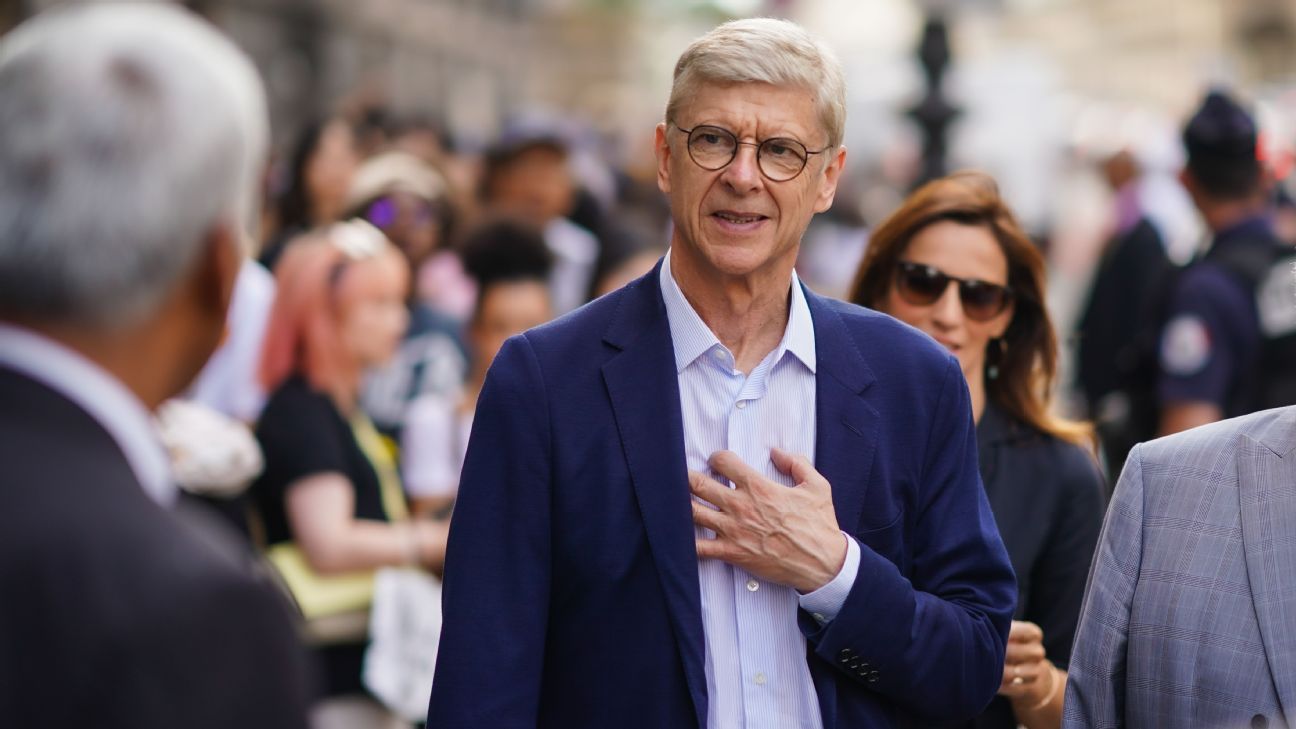
Can you imagine a world where there is a major international tournament held every year? The idea is closer to becoming a reality than you might think.
Following a proposal by the Saudi Arabian Football Federation in May, FIFA is now carrying out a feasibility study into the practicalities of altering the World Cup cycle from four years to two, meaning that continental championships (like the Gold Cup, European Championship and Copa America) would be sandwiched in the alternate years. The study is being led by former Arsenal manager Arsene Wenger (now FIFA's Chief of Global Football Development) and 166 of FIFA's 210 national associations have given their backing to the research into the idea.
There is resistance, though. UEFA president Aleksander Ceferin voiced his opposition last week, while the major leagues have yet to be canvassed and convinced. But, speaking in L'Equipe at the weekend, Wenger spelled out the thinking behind the proposal to not only increase the regularity of World Cups, but also re-draw the international calendar in a way that suits all elements of the game.
It would mean more major tournaments but fewer international breaks, more opportunities for nations to stage World Cups, and clubs suffering less disruption from international fixtures.
So what does it all mean, and what are the pros and cons of Wenger's blueprint for the international game?
- World Cup qualifiers on ESPN+: Stream LIVE games, replays (U.S)
- How 2022 World Cup qualifying works around the world
WHY IS THERE EVEN A PLAN TO HAVE BIENNIAL WORLD CUPS?
FIFA president Gianni Infantino wants bigger World Cups -- the 2026 finals in the United States, Mexico and Canada will be the first 48-nation tournament -- and he also wants the international game to reclaim some of the financial power, commercial impact and status of the club game.
Staging World Cups every two years, as well as continental championships in the intervening years, would ensure a fixed, annual slot in the football calendar for the international game to dominate the agenda.
There is also a view within FIFA that the four-year World Cup cycle is an outdated model, an anachronism in a world driven by social media and 24-hour news, and that younger audiences, and sponsors, want more high-quality events rather than having to wait four years for World Cups to come around.
And there are many nations, including Saudi Arabia, who want a shot at hosting a World Cup. Staging one every two years would enable FIFA to clear the backlog of nations including China, England, Morocco, Spain and Argentina who could otherwise be waiting for decades to stage a World Cup on home soil.
While Wenger's study is focused on the men's game and untangling the congested calendar, there are also plans to stage a biennial World Cup in the women's game. "We don't want to copy what the men are doing. We want something specific for women and for the women's game," Infantino said in 2020. "We need to get those creative juices flowing."
IS THERE MUCH OPPOSITION TO THE PLAN?
Yes, and primarily from UEFA. Sources have told ESPN that the UEFA hierarchy regard the plan as nothing less than a way to curtail the power of Europe within the world game.
In a letter to Football Supporters Europe (FSE) at the weekend, UEFA president Ceferin cited his "grave concerns" over the proposal and accused FIFA of launching a "PR campaign" without consulting confederations or national leagues.
European football is the powerhouse of the world game, with the leading domestic leagues, richest clubs and Champions League all giving UEFA huge influence. And it will be 20 years next year since a non-European nation last won the World Cup (Brazil in 2002).
But the increasing financial reliance of major European teams on sponsors and owners from Asia -- namely Qatar, the United Arab Emirates, China -- and the U.S. has shifted the balance of power and given FIFA the opportunity to canvass support for a radical overhaul of the international calendar.
The African Confederation (CAF) has backed the study and there is a growing support in Asia, so UEFA has a battle on its hands.
WHAT ARE THE KEY ELEMENTS OF WENGER'S BLUEPRINT?
Wenger believes that increasing the regularity of World Cups will ultimately boost all aspects of the game.
He has proposed two international breaks, in March and October, and groups of four nations playing just six qualifying games which Wenger believes will ensure "more high-stakes and high emotion games."
The plans are still a work in progress, so detail on how those four-team groups would be put together is light, but it seems that minnows such as Andorra, San Marino and Gibraltar would have to pre-qualify as lower-ranked nations have done for years in Africa, Asia and North/Central America.
Wenger claims that the "beauty and prestige of a tournament" depends on its quality rather than regularity and suggests that playing every two years will give the world high-class international fixtures and memorable tournaments.
He believes that, by having just two international breaks each year, leading clubs will see the advantages of having their players for longer and with less disruptive fixture calendars. And he is also proposing a compulsory 25-day rest period for players after international tournaments.
THIS DOESN'T SOUND VERY WORKABLE, DOES IT?
If you factor in a 25-day break after a four-week summer tournament, then that amounts to close to two months when players are away from their clubs. When you consider that the leading clubs all embark -- pre-COVID 19 pandemic -- on lucrative preseason friendly tours, there is an obvious area of confrontation between club and country before the competitive action even starts.
Reducing international breaks to two per year sounds great in practice, but can a World Cup qualification campaign really be boiled down to just six games? UEFA has 55 member nations and even in a 48-team World Cup, is only due to have 16 participants, so it would mean 14 qualifying groups if you kept the likes of Andorra and San Marino involved.
If that was the case, there would be some very unchallenging groups for the major nations and not many of the "high stakes/high emotion" games that Wenger believes are necessary.
Africa has 54 member nations and only nine slots in a 48-team World Cup, so the maths in their qualifiers would be even more complicated. South America, meanwhile, will have six qualifiers from 10 member nations, so their qualifying campaign could be over after just a couple of fixtures.
Will Brazil be awarded win over Argentina after match was stopped?
Gab Marcotti discusses what happens after Brazil's match was abandoned when Brazilian health officials objected to the participation of three Argentina players.
THE INTERNATIONAL GAME IS IN NEED OF REFORM, THOUGH, ISN'T IT?
The World Cup remains the pinnacle of the game and it would still be difficult to find a player who would place winning the Champions League above lifting the World Cup, but it is outside the major tournaments that international football is struggling to remain relevant and interesting.
There are just too many games that are one-sided non-events, but even though England beat Andorra - who are ranked 156th in the world -- 4-0 at Wembley on Sunday with a virtual second string selected by manager Gareth Southgate, over 67,000 fans turned up to watch. When you factor in the gate receipts and TV money, even the biggest associations will still want to play games that have little or no competitive edge, purely because of the financial benefits.
England haven't lost a World Cup qualifier since 2009 and Spain's defeat to Sweden last week was their first in the format since 1993, so there is a clear issue in terms of competitiveness during the qualifiers. Continental heavyweights continue to miss out on World Cups -- Netherlands, Italy and the United States all failed to qualify for Russia 2018 -- but that can be down to imbalanced groups or just a bad campaign. Too often, though, the qualifiers can be predicted before a ball has even been kicked.
So perhaps introducing pre-qualifiers for the lower ranked teams and creating more competitive groups is the way forward. But how many associations will realistically vote for fewer fixtures and groups that make it harder to qualify?
WENGER'S PLAN HAS ITS POSITIVES, THOUGH?
Yes. Few fans, players, sponsors or broadcasters would turn down the spectacle and excitement of a World Cup every two years. The traditionalists might complain about diminishing the value of the tournament by staging it every two years, and the clubs would certainly have their issues, but football is ultimately about entertainment and glory. The World Cup delivers both in huge quantities.
Increasing the regularity of World Cups would also help solve the political and geographical problem of fairly distributing hosting rights.
Africa has staged just one World Cup -- 2010 in South Africa -- and Morocco has tried and failed on five occasions to host the tournament. England, the home of the Premier League, has not staged it since 1966, while Argentina, Uruguay and Chile are desperate to take the tournament back to South America for only the second time since 1978.
Australia and China also want to host a World Cup, so even if today FIFA agreed a running order of Morocco, England, Argentina, China and Australia on a four-year cycle, it would be 2046 before Sydney, Melbourne and Adelaide had a chance to be gripped by World Cup fever.
There are too many countries that are willing and able to host a World Cup that continue to be frustrated, so creating a two-year cycle would ensure a truly global spread of tournaments in the years ahead.
SO WHEN WILL THIS ALL BE DECIDED?
Having embarked on his study in May, Wenger has suggested it could all be resolved by December, but that would appear to be an ambitious timescale, particularly with the prospect of strong opposition from UEFA, as well as the major leagues and top clubs.
The international calendar is now set all the way up to the 2026 World Cup, so no change could take place until 2028 at the earliest -- and UEFA is due to stage Euro 2028 that year. So realistically, a new biennial World Cup cycle is unlikely to kick in until 2030 (the centenary of the tournament) and the soonest this could feasibly be voted on is at the 2022 FIFA Congress.
It is a thorny subject, but one with gathering support and UEFA may find itself outflanked on this issue. Football is an evolving game and, as Wenger says, "we have to anticipate the future."















 Phone: (800) 737. 6040
Phone: (800) 737. 6040 Fax: (800) 825 5558
Fax: (800) 825 5558 Website:
Website:  Email:
Email: 






